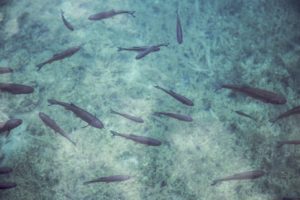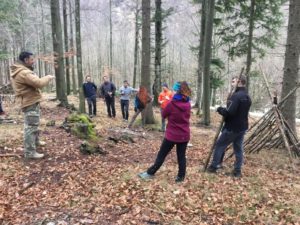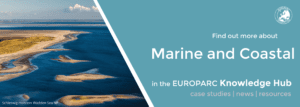The role of Local and Regional Authorities in protecting the marine environment
Source: Adobe Stock
The EUROPARC Federation, along with other stakeholders, has been invited to discuss challenges and opportunities related to protection of the marine environment at the subnational level. In this article, you will find a summary of the discussed points.
Subnational authorities protecting the marine environment
The European Committee of the Regions (CoR) is currently drafting an opinion on the role of Local and Regional Authorities in protecting the marine environment. The local and regional (subnational) dimension of the Marine Strategy Framework Directive hasn’t received enough attention yet.
Moving forward with this unexplored dimension could accelerate the ambitious task to tackle the challenges highlighted in the report on the first implementation cycle of the Marine Strategy Framework Directive, published by the European Commission in June 2020.
The challenges mentioned in the report are mainly connected with the CoR’s work on the European Green Deal, specifically its environmental component, which is strategic for the post-COVID-19 green and digital recovery. A recent report from the Court of Auditors also shows that biodiversity loss continues, and points to the possibility to increase the potential of EU funding for marine conservation objectives.

Sea floor with fish. Photo: Pixabay
The rapporteur for this opinion, Ms Emma NOHRÈN (SE/Greens) invited EUROPARC and other stakeholders to discuss the most important challenges and opportunities at the subnational level, related to protection of the marine environment.
During the debate, EUROPARC stressed the role of marine Protected Areas, and underlined the following points:
- The importance to recognize the role of Marine Protected Areas in the local plans for marine environment protection and local development.
- The necessity to guarantee adequate political attention, budget, human resources and skills to the Marine Protected Areas, not only to achieve the 30% target planned in the new EU Biodiversity Strategy, but especially to reach a good and efficient management.
- The importance of coordination between local, regional and national authorities in charge of marine topics.
- At each level, the importance of coordination between the different authorities in charge of environment, fishery, transport, but also of defense (Navy) if pertinent at the regional level, and so on.
- The need of coherence of policies in the land and in the sea, because what happens in the land (for example agricultural practices) has a decisive impact on the sea. Therefore, a coordination with Farm to Fork Strategy (also but not only for the sea food) and CAP, is essential.
- If in charge of a Marine Protected Area, the local authority has to guarantee adequate attention and priority to the Marine Area in relation to its different policies and responsibilities.
- In all cases, even if not directly involved in the management of Marine Protected Areas, local and regional authorities are crucial in establishing good and long-term relation with local communities and stakeholders, as fishermen and tourism business.
- In order to guarantee involvement of the private sector, for example, the local and regional authorities have to take clear and long term political decisions. These decisions should result in a stable framework for the private sector to decide how and when to make investments and in which direction they should drive their enterprises.
- Partnerships with local stakeholders can be supported by local authorities, with focus on dialogue and implementation of win-win solutions. For example, local and regional authorities can provide specific recognitions to fishermen that work in a sustainable way and in cooperation with the Marine Protected Areas. The same can be done for the tourism business (EUROPARC promotes for example the Charter for Sustainable Tourism in Protected areas, that awards Protected Areas and their private partners).
Find more information about the event here!
The Draft Opinion (pre-vote) in all EU languages is available here. At the same link, from May 25th, it will be possible to download in all EU languages the final version (post-vote in CoR Plenary) of the Opinion, which will provide the formal position of the CoR on marine protection by subnational authorities.
An inspiring new book for young people by Hendrickus van Hensbergen
EUROPARC’s Executive Director Carol Ritchie received a version of the new book “How you can save the planet” by Hendrickus van Hensbergen which is available here now. It combines practical step-by-step actions with the inspiring stories of young environmental activists leading change across the world. A proportion of the royalties will support Hendrick’s work with young people at Action for Conservation. You can read Carol’s review of the book down below.
“I have been lucky enough, in my role as Executive Director, to attend many EUROPARC Junior Ranger and Youth+ camps and our young people, without fail, provide me with new energy, motivation and inspiration. EUROPARC remains committed to ensuring young people have a central role in our thinking and activities as an organisation. Thus, I am always on the lookout for tools, tips and ideas that would support the same in our members areas.
It was with interest then that we received a copy of a new book “How you can save the planet” by Hendrickus van Hensbergen, the Founder and Chief Executive Officer of the charity “Action for Conservation”. Many will remember his stimulating input into our EUROPARC conference 2018 in Scotland. Hendrikus is not only a young entrepreneur working for conservation – he is inspiring other youngsters to lead the change and his new book is a great tool to do just that!
“How you can save the planet” is filled with personal stores from young people themselves, showing what sparked their interest in nature and what motivates them to be active ambassadors and campaigners.
The book shares what they have done to tackle issue like single use plastics, fighting for cleaner air, being more sustainable and caring for nature, with examples from inspiring young people of all ages and abilities.
In addition, the book describes many practical activities and ideas for young (and indeed not so young!) people to get active and do something about the environmental issues that concern them.
Drawing on Hendrikus’s work with Actions for Conservation, the books shows how to put young people at the center of decision-making and to feel empowered to make a difference and positive change to protect the natural world. You can see the interview he gave EUROPARC here.
Even though I can’t visit a Junior Ranger or Youth camp I was still inspired by the stories of these remarkable young people described in Hendrikus’s book.
So, for those of us in an older age group this book reminds us of the energy, passion and motivation and potential of our young people, if we give them the space and tools to act.
The book gives plenty of practical ideas for young people themselves to try out but indeed too could be helpful for Rangers, mentor or anyone working with young people in our protected areas.
So, make sure your park has a copy of “How you can save the planet”, buy one for your Junior Rangers and Youth+ groups.
Carol Ritchie”
Biosphere Reserves in Germany
The Schwäbische Alb Biosphere Reserve: location of the 2011 EUROPARC Conference © EUROPARC Nordic Baltic Section
Biosphere reserves around the world and across Europe create a powerful network of fascinating landscapes and valuable ecosystems. Read about biosphere reserves in Germany in a new publication by Nationale Naturlandschaften e.V.
New publication: Biosphere reserves in Germany
German biosphere reserves are home to a great diversity of habitats with a varied range of animal and plant species. In a new publication “Biosphere reserves in Germany“, the Nationale Naturlandschaften (formerly known as EUROPARC Germany) presents the diversity of Germany’s 16 biosphere reserves and their role for people.
Contributing to regional values through sustainable tourism, providing jobs in rural regions, offering space for leisure and recreation, are just some examples of why biosphere reserves deserve more of our attention.
Download the publication here!

Bush craft workshop organised in the Julian Prealps MAB reserve. Photo: Julian Prealps
What are biosphere reserves?
Biosphere reserves are areas of land and coastal ecosystems promoting solutions to reconcile biodiversity conservation with its sustainable use. They are internationally recognized and nominated by national governments. Simply put, biosphere reserves are “living laboratories that boost nature-based solutions for sustainable development“.
They are sites for testing interdisciplinary approaches to understanding and managing changes and interactions between social and ecological systems, including conflict prevention and management of biodiversity.
Biosphere Reserves are designated under the intergovernmental Man and the Biosphere (MAB) Programme, a scientific programme created by UNESCO, that aims to establish a scientific basis for enhancing the relationship between people and their environments.
MAB Programme celebrates 50 years!
UNESCO’s Man and the Biosphere Programme was created in 1971 with a vision to promote sustainable connection between people and nature. As it evolved, the idea materialised in the designation of biosphere reserves.
Currently, the World Network of Biosphere Reserves counts 714 sites in 129 countries all over the world, including 21 transboundary sites. We are proud to represent a number of MAB Reserves in Europe, who are also members of the EUROPARC Federation.
Check the opportunities to get involved in the celebrations of 50 years of MAB, and to pay tribute to the common thread among humanity and nature!
Nominations for EUROPARC Council and President are open!
EUROPARC General Assembly 2017, Termas de Sao Pedro do Sul, Portugal
Every three years the EUROPARC Federation Council, including the President, needs to be elected. A new council would normally have been elected in 2020, however, due to the corona crisis this was not possible. The last Council was elected in 2017. This year’s elections will be held at the onilne General Assembly on 5th of October.
The Federation will need enthusiastic, interested men and women, from any member of the EUROPARC Federation across Europe. We therefore encourage all members from all our member countries to participate.
We are now looking for our members to nominate suitable candidates for the 2021 elections.
Given the complexity of the work of the EUROPARC Council the following suggestions of skills, knowledge and experience are needed:
- The ability to work in English on a regular basis
- Information and experience about trends in public administrations and strategic planning
- Familiarity with business models that are used by other federations and organisations would be useful.
- Experience from governance bodies in other organisations such as being on advisory boards, councils, would be appreciated.
Nominations are exclusive for EUROPARC members
All information and the nomination form is available on this page. Please note that this page is password protected. If you are a member and do not have the password, please drop us an email to members.europarc@europarc.org.
If you are interested in taking up this amazing challenge and opportunity, as a member of the EUROPARC Federation, you need to seek a nomination from another member. A member cannot nominate a person from within its own organisation.
Alternatively if you/your organisation, as a member of the Federation, have identified a suitable person (from another organisation ) then
- check their organisation remains a member of EUROPARC (we can do that for you too)
- please seek the approval of the individual, then complete the nomination form
Please note, that these elections are only open to full EUROPARC members.
We are looking forward to receiving your nominations,
EUROPARC Directorate
